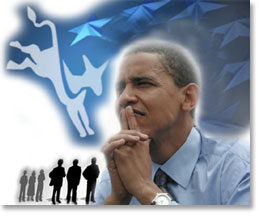By Ron Walters
-Guest Columnist-
FCN Editorial – Is America’s attitude changing? (FCN, 01-14-2008)

With Barack Obama about to foreclose on the Democratic nomination for president, he will also end 16 years of Clinton leadership of the Democratic Party, and should he go on to win the White House, Obama will strengthen that control. The nomination struggle has partially been about is who will control the party apparatus that is responsible for carrying the party agenda, helping to elect Democrats at other levels of government and seeding its members into the national governmental structure.
Yet, the media has missed the fact that Obama’s successful campaign and his elevation as the leader of the Democratic Party should be seen as resting on the shoulders of the civil rights movement that created the Voting Rights Act, the intervention of Fannie Lou Hamer and the Freedom Democratic party to break up segregated convention delegations in the South; and the actions of Dick Hatcher and others to create a fair and inclusive party charter in the 1970s.
Most importantly, the Jackson campaigns for president in 1984 and 1988, helped change the party’s delegate selection rules, without which Obama could not have won so many delegates. Jackson’s themes of hope and change also run through Obama’s campaign and have connected not only with Blacks but Whites in a time of significant need and despair. By the 1988 election, Jackson had won 7 million votes (600,000 of them from Whites) and arrived at the 1988 convention with over 1,200 delegates.
With this performance he became leader of the progressive wing of the Democratic Party and helped Ron Brown to become the first Black chair of the Democratic Party.
Ronald Reagan had helped to successfully create the notion that the Democratic Party was the party of Blacks and this inference led many Whites into the Republican party. Therefore, when Bill Clinton seized control of the Democratic Party as its nominee in 1992, his campaign initiated the kind of the racial politics we see now, by executing Black mentally challenged convict Ricky Ray Rector and criticizing rap singer Sister Souljah at Rev. Jackson’s convention in January of that year.
The point was to telegraph to the Reagan Democrats that they could come back home, that Blacks should not be perceived any longer as leading the party.
In office, instead of fighting to continue the Roosevelt and Lyndon Johnson legacy of the party, l Clinton created a “third way” between that legacy and the conservative Newt Gingrich ideology. The Democratic Leadership Council, headed now by Black former Rep. Harold Ford, Jr., was formed. Ford was on “Meet the Press” May 18 discussing the special election Democratic victory in a Mississippi House district George Bush won by 25 percent in 2004. In places like that, “You can’t run a liberal campaign. It was a conservative Democrat, moderate Democrat approach. That approach is on the ascendancy in the party. If Barack Obama adopts that approach, he will enjoy more success in many places around the country and might be able to expand a map to the extent his team is suggesting,” said Ford.
If this approach is really on the ascendancy in the party, it raises a question about what control of the Democratic Party apparatus by Obama will mean and specifically will Black interests be sacrificed again for Democrats to win the White House?
In the 2006 election, “Blue Dog” Democrats (of which Ford was a member) increased their numbers to equal that of the Congressional Black Caucus. If the Reagan Democrats do come home and their numbers in Congress increase, will Obama feel obliged to follow their lead?
It seems that when Obama captures control of the party at the August Convention, Black leaders will have to be diligent about what happens to both the party and issues as he moves toward the White House.
Ron Walters is director of the African American Leadership Center and professor of Government and Politics at the University of Maryland. One of his latest books is “Freedom Is Not Enough: Black Voters, Black Candidates and American Presidential Politics.”












